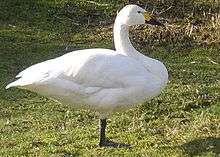고니
Korean
Etymology
From the archaic forms 곤이 (goni) and 곤 (gon); the latter is attested in the Worin Seokbo, 1457. Probably from the Sino-Korean lexeme 곤 (鵾 or 鶤, gon) in the sense of 곡 (鵠, gok, “swan”).
Pronunciation
- IPA(key)[ko̞ni]
- Phonetic Hangul[고니]
|
Derived terms
- 검은고니 (geomeun-goni): black swan
See also
This article is issued from
Wiktionary.
The text is licensed under Creative
Commons - Attribution - Sharealike.
Additional terms may apply for the media files.
